- Mon - Sat, 10:30 AM to 07:00 PM
- + 91 98947 99699
- admin@mesodental.in
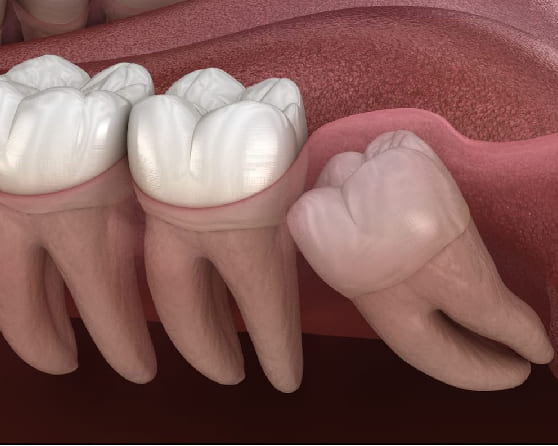
Our third set of molars, also known as wisdom teeth, helped our early ancestors to grind plant tissues, a part of their diet that was difficult to chew and break down. Over the years, as our food became easier to chew and digest, our jaws gradually got smaller.
Despite the lack of space, wisdom teeth continue to develop in most human mouths and usually erupt between the ages of 17 and 25. Wisdom teeth often cause problems as there is insufficient room for them to erupt properly.
Wisdom teeth that have erupted normally can be removed by regular extractions. However, if the tooth is impacted, surgery will be required.
Wisdom teeth may grow in a tilted manner and be impeded by the neighbouring tooth. When the tooth is only partially erupted, the gums can become swollen and painful as it is difficult to brush and keep the tooth clean.
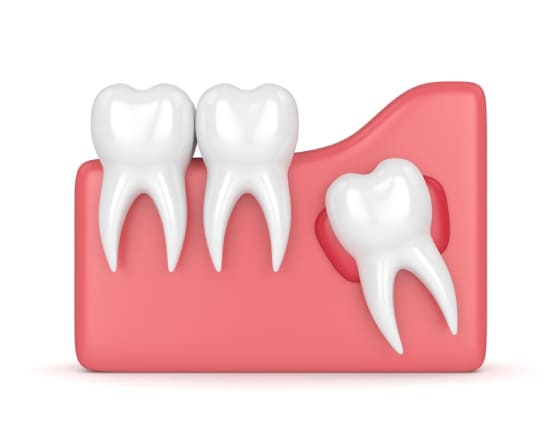
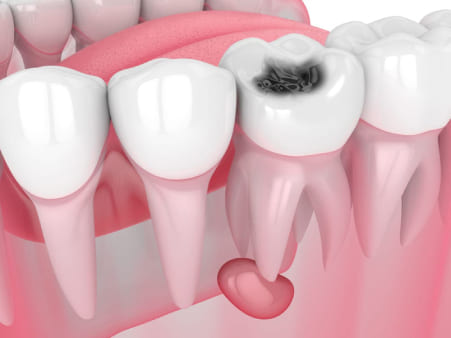
Being positioned so far at the back of our mouths, wisdom teeth can be difficult to brush and floss. This commonly results in decay. If the tooth is impacted, food also tends to get trapped easily, resulting in decay on both the wisdom tooth and the tooth in front.
Cysts occur when there is a buildup of fluid around an unerupted tooth. Although these cysts do not usually start out harmful, they can become infected and hurt the neighbouring teeth and bone if left untreated.
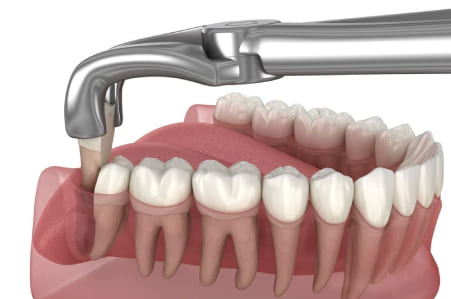
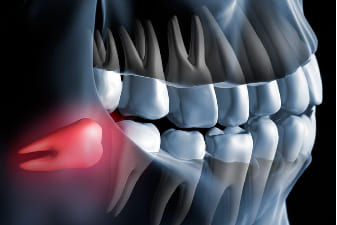
Removing an impacted wisdom tooth is a surgical procedure which involves making a small incision in the gums and removing the tooth under local anesthesia, sedation, or general anesthesia. This procedure can be done with our general dentist or an oral maxillofacial surgeon, depending on the sedation selected.
Depending on the complexity of the extraction, the duration of the surgery itself can vary between 15 and 60 minutes.
These methods will require an anesthetist and are generally only available in a hospital setting. Local anesthesia is sufficient to block any pain you may feel during wisdom tooth surgery. If still have concerns regarding the anesthesia, please let your dentist know during the consultation and they will be be happy to hear your concerns and provide their professional advice.
We recommend that you avoid physical exertion for the first few days after your surgery, as your body will need rest in order for the surgical site to heal quickly and smoothly.
Wisdom tooth surgery can be done by most general dentists, and it is not necessary to be seen by a specialist oral surgeon. However, we do have an oral maxillofacial surgeon in our group who will be able to carry out more complex surgeries if necessary.
Generally, 5 days of MC will be given for surgical removal of wisdom tooth. For all other types of extractions, kindly raise your concern to your treating dentist and he/she will assess your condition to see if you require medical leave.
You may experience pain, swelling, or discomfort for several days, which can be treated with painkillers. You will also be given antibiotics to reduce any risk of infection. Should the symptoms persist or worsen, please contact the clinic immediately.
It is common to have slight bleeding from the surgical site for 1-2 days after surgery. Replace the gauze on the bleeding area as needed every 30-45 minutes and bite on the gauze firmly. Keeping your head elevated with pillows can also help to control bleeding. However, if bleeding continues or increases, please call our clinic immediately.
Blood clot formation is necessary to stop bleeding. Please do not touch the extraction site with your tongue or fingers, drink liquids through a straw, spitting vigorously, or rinse your mouth on the day of the extraction/surgery as these actions will disturb the blood clot.
Once the numbness has worn off, it is important that you eat, as nourishment is important to the healing process. Eat soft foods like yogurt, puddings, soups and cool porridge for the first 48 hours. While your mouth is still numb, avoid hot food as you may burn yourself. Please also refrain from smoking as it will slow down the healing process.
Be sure to brush and floss the other areas of your mouth as you would normally. The space left by the tooth may feel a bit strange to you at first. Eventually, new bone and gum tissue will grow into the gap left by the extraction.
Stiff jaw muscles may cause a limitation in opening the mouth wide for a few days after surgery. This usually resolves during the week after surgery.
Some discomfort after the extraction/surgery is normal. We have prescribed pain reliever to take if needed. To avoid nausea, take pain medication after food or with gastric-protective medicine. You can also decrease pain and swelling by applying an ice pack – 20 minutes on, 20 minutes off – for the first 6 hours following the extraction/surgery. If it is still unbearable after taking these measures, please book an appointment with us for a review of the surgical site.